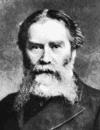- Lowell, James Russell
-
born Feb. 22, 1819, Cambridge, Mass., U.S.died Aug. 12, 1891, CambridgeU.S. poet, critic, editor, and diplomat.He received a law degree from Harvard but chose not to practice. In the 1840s he wrote extensively against slavery, including the Biglow Papers (1848), satirical verses in Yankee dialect. His other most important works are The Vision of Sir Launfal (1848), a long poem on the brotherhood of mankind; and A Fable for Critics (1848), a witty evaluation of contemporary authors. After his wife's death in 1853, he wrote mainly essays on literature, history, and politics. A highly influential man of letters in his day, he taught at Harvard, edited The Atlantic Monthly and The North American Review, and served as minister to Spain and ambassador to Britain.
 James Russell Lowell.Library of Congress, Washington, D.C.
James Russell Lowell.Library of Congress, Washington, D.C.* * *
▪ American poet and criticborn Feb. 22, 1819, Cambridge, Mass., U.S.died Aug. 12, 1891, CambridgeAmerican poet, critic, essayist, editor, and diplomat whose major significance probably lies in the interest in literature he helped develop in the United States. He was a highly influential man of letters in his day, but his reputation declined in the 20th century.A member of a distinguished New England family, Lowell graduated from Harvard in 1838 and in 1840 took his degree in law, though his academic career had been lacklustre and he did not care to practice law for a profession. In 1844 he was married to the gifted poet Maria White, who had inspired his poems in A Year's Life (1841) and who would help him channel his energies into fruitful directions.In 1845 Lowell published Conversations on Some of the Old Poets, a collection of critical essays that included pleas for the abolition of slavery. From 1845 to 1850 he wrote about 50 antislavery articles for periodicals. Even more effective in this regard were his Biglow Papers, which he began to serialize June 17, 1846, and the first series of which were collected in book form in 1848. In these satirical verses, Lowell uses a humorous and original New England dialect to express his opposition to the Mexican War as an attempt to extend the area of slavery. The year 1848 also saw the publication of Lowell's two other most important pieces of writing: The Vision of Sir Launfal, an enormously popular long poem extolling the brotherhood of man; and A Fable for Critics, a witty and rollicking verse evaluation of contemporary American authors. These books, together with the publication that year of the second series of his Poems, made Lowell the most popular new figure in American literature.The death of three of Lowell's children was followed by the death of his wife in 1853. Henceforth his literary production comprised mainly prose essays on topics of literature, history, and politics. In 1855 his lectures on English poets before the Lowell Institute led to his appointment as Smith professor of modern languages at Harvard University, succeeding Henry Wadsworth Longfellow. After a yearlong visit to Italy and Germany in 1855–56 to study, he held this professorship for the next 20 years. In 1857 he married Frances Dunlap, who had cared for his only remaining child, Mabel; and in that year he began his four years' editorship of the new Atlantic Monthly (Atlantic Monthly, The), to which he attracted the major New England authors. Lowell wrote a second series of Biglow Papers for the Atlantic Monthly that were devoted to Unionism and that were collected in book form in 1867. After the American Civil War he expressed his devotion to the Union cause in four memorial odes, the best of which is “Ode Recited at the Harvard Commemoration” (1865). His essays such as “E Pluribus Unum” and “Washers of the Shroud” (1862) also reflect his thought at this time.Disillusioned by the political corruption evident in President Ulysses S. Grant's two administrations (1869–77), Lowell tried to provide his fellow Americans with models of heroism and idealism in literature. He was editor with Charles Eliot Norton of North American Review from 1864 to 1872, and during this time appeared his series of critical essays on such major literary figures as Dante, Chaucer, Edmund Spenser, John Milton, William Shakespeare, John Dryden, William Wordsworth, and John Keats. These and other critical essays were collected in the two series of Among My Books (1870, 1876). His later poetry includes The Cathedral (1870), a long and ambitious but only partly successful poem that deals with the conflicting claims of religion and modern science.President Rutherford B. Hayes (Hayes, Rutherford B.) rewarded Lowell's support in the Republican convention in 1876 by appointing him minister to Spain (1877–80) and ambassador to Great Britain (1880–85). Lowell won great popularity in England's literary and political circles and served as president of the Wordsworth Society, succeeding Matthew Arnold. After his second wife died in 1885, Lowell retired from public life.Lowell was the archetypal New England man of letters, remarkable for his cultivation and charm, his deep learning, and his varied literary talents. He wrote his finest works before he was 30 years old, however, and most of his subsequent writings lack vitality. The totality of his work, though brilliant in parts, ultimately suffers from a lack of focus and a failure to follow up on his undoubted early successes.* * *
Universalium. 2010.
